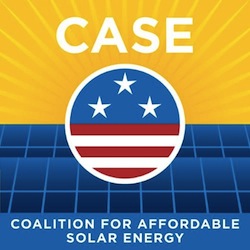The U.S. Department of Commerce has imposed new anti-dumping tariffs as high as 165.04 percent on imports of solar products from China and 44.18 percent on imports from Taiwan. It should be noted, that China has instituted anti-dumping tariffs on solar panels entering their country as well.
In response to the announcement, Jigar Shah, president of the Coalition for Affordable Solar Energy (CASE), said, “Today’s determination is another unnecessary obstacle for the U.S. solar industry that will hinder  the deployment of clean energy by raising the prices of solar products. Due to these tariffs, previously viable projects will go unbuilt, American workers will go unhired and consumers that could have saved money through solar energy may not be able to benefit.”
the deployment of clean energy by raising the prices of solar products. Due to these tariffs, previously viable projects will go unbuilt, American workers will go unhired and consumers that could have saved money through solar energy may not be able to benefit.”
Shah noted that SolarWorld has issued a request to expand the scope of products affected by the solar dispute, but the U.S. Department of Commerce has made no decision. CASE members a disappointed and Shah said accepting a broader scope would eliminate decades of legalalize that defines scope using the ‘single country of origin’ and ‘substantial transformation’ trade rules. The proposed new scope is also fundamentally inconsistent, said Shah, with the Department’s own previous determination in the 2012 solar cell dispute.
“We urge SolarWorld AG to work with the U.S. solar industry and choose to end their continued litigation in favor of a win-win solution like the Solar Energy Industries Association (SEIA) settlement proposal,” added Shah. “CASE members, which represent the industry majority, demand a solution that ends uncertainty in the marketplace by preventing further trade litigation and that allows solar power to compete cost-effectively with traditional energy sources, thus enabling the market’s further growth. To aid in this process, we ask President Obama to make resolving the solar trade dispute a priority on his clean energy agenda and convene the parties for negotiations.”
According to the 2013 National Solar Job Census, the U.S. solar industry currently employs over 142,000 Americans, 70 percent of which are employed downstream in the system installation, sales, distribution and project development sectors. Solar product manufacturing remains robust, employing over 29,000 Americans, but the narrow solar cell manufacturing industry that would benefit from these tariffs represents less than 2 percent of overall U.S. solar employment.
John Morrison, COO of Strata Solar, based in Chapel Hill, North Carolina and representing over 1,000 jobs added, “Due to their scale, the utility and large commercial solar sectors are particularly sensitive to the uncertainty and price increases caused by these tariffs. Until this dispute is resolved, our industry will build fewer projects and install less solar. It’s time to end the litigation, negotiate a solution and put more Americans back to work.”

